

Students-using-ai-to-teach-robot-how-to-recognize-human-emotions-1. A group of Ontario students are using artificial intelligence to train a robot to recognize human emotions and “empathize” with its companion.

The students at Ontario Tech University in Oshawa, Ont., have been programming a Zenbo, a robot companion designed by the technology company Asus, to read and react to human emotions. “We have made some progress, but from that to the point where the robot can build empathy for the human, there is a long way to go,” Miguel Vargas Martin, computer science professor at the Ontario Tech University, told CTV News Channel. Africa Must Improve Its Welfare Services. Taking Brain Vitals: New Tools to Detect Mental Disorders By Susan Blumenthal, M.D., M.P.A. and Olivia Y.
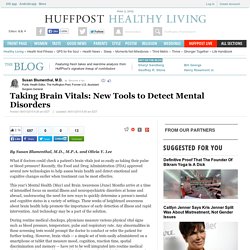
Lee What if doctors could check a patient's brain vitals just as easily as taking their pulse or blood pressure? Recently, the Food and Drug Administration (FDA) approved several new technologies to help assess brain health and detect emotional and cognitive changes earlier when treatment can be most effective.
This year's Mental Health (May) and Brain Awareness (June) Months arrive at a time of intensified focus on mental illness and neuropsychiatric disorders at home and abroad, underscoring the need for new ways to quickly determine a person's mental and cognitive status in a variety of settings. These weeks of heightened awareness about brain health help promote the importance of early detection of illness and rapid intervention. During routine medical checkups, physicians measure various physical vital signs such as blood pressure, temperature, pulse and respiratory rate.
Wearable technology: Canada emerging as a global leader. Child-Free Day celebrates choice to be childless - Montreal. Roulo-Boulo job bus aims to help Montreal youth find employment - Montreal. Why the Millennials Are the Most Important Generation Yet - Singularity HUB. Millennials are those born between 1980-2000, today between the ages of 15-35.
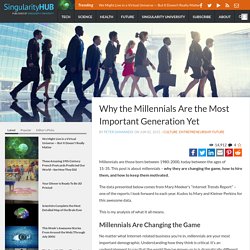
This post is about millennials – why they are changing the game, how to hire them, and how to keep them motivated. Aboriginal women now make up one-third of Canadian female prison population - Thunder Bay. The number of aboriginal women in Canadian prisons is on the rise, according to the federal prison watchdog and the Native Women's Association of Canada wants justice officials to do something about it.

Women of aboriginal descent now make up more than 35 per cent of the female prison population, Howard Sapers, Correctional Investigator of Canada, told CBC News this week. Aboriginal women represent about four per cent of the general population. St. Michael’s Hospital health team offers prescription for poverty. Ten years ago, Dr.
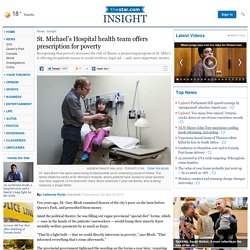
Poverty-linked heart risks greatest for poor black women, younger adults. Crafting a plan to tackle poverty from the ground up. Zoom Toronto has the highest rate of child poverty, more working poor and the largest inequality gap of any city in the country.
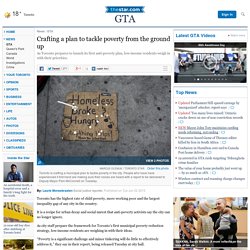
It is a recipe for urban decay and social unrest that anti-poverty activists say the city can no longer ignore. As city staff prepare the framework for Toronto’s first municipal poverty reduction strategy, low-income residents are weighing in with their ideas. “Poverty is a significant challenge and minor tinkering will do little to effectively address it,” they say in their report, being released Tuesday at city hall. Written by Commitment 2 Community, a coalition of social agencies, advocates and community leaders, the report captures the views of hundreds of residents living in poverty who attended dozens of meetings on the issue over the past six months. Poverty linked to future high health-care costs - Health.
People living in poverty are more likely to place a high burden on the health-care system but addressing the inequity could prevent both medical complications and health expenditures, Canadian doctors and public health experts say.
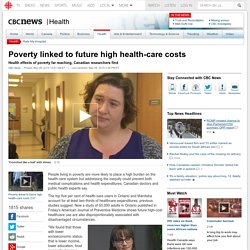
The top five per cent of health-care users in Ontario and Manitoba account for at least two-thirds of healthcare expenditures, previous studies suggest. Now a study of 50,000 adults in Ontario published in Friday's American Journal of Preventive Medicine shows future high-cost healthcare use are also disproportionately associated with disadvantaged circumstances. Income inequality damaging Canadian economy - Manitoba. While the rich keep getting richer and the poor get poorer, new research is showing that income inequality is harmful to a country’s economic growth.

Earlier this month, the OECD published a watershed document on income inequality that has gone unnoticed in Canada. The author, Frederico Cingano, argues there is a “sizeable and statistically negative” relationship between income inequality and economic growth. He also concludes that raising income taxes on the rich can help the situation, rather than reducing growth.
Explicit cookie consent. AT FIRST glance the patriarchy appears to be thriving.
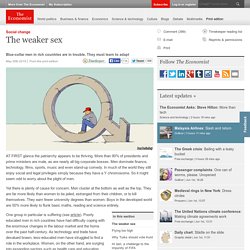
More than 90% of presidents and prime ministers are male, as are nearly all big corporate bosses. Men dominate finance, technology, films, sports, music and even stand-up comedy. In much of the world they still enjoy social and legal privileges simply because they have a Y chromosome. So it might seem odd to worry about the plight of men. Yet there is plenty of cause for concern. Rise of the 'precariat,' the global scourge of precarious jobs. With relatively little notice, the world passed a modern milestone recently, one that makes any yearning for more stable times seem very farfetched — the global jobless total passed 200 million.
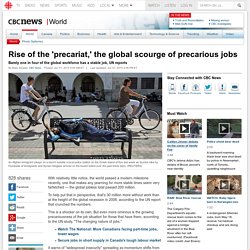
To help put that in perspective, that's 30 million more without work than at the height of the global recession in 2008, according to the UN report that crunched the numbers. Health Workers and Patients Under Threat in 17 Countries, Report Finds. Geneva — Health workers, patients and medical facilities have come under attack in 17 countries since the start of 2014, a coalition of 24 nongovernmental organizations said in a report released Wednesday that urged a greater international effort to protect health services. The report was released jointly by Human Rights Watch and the Safeguarding Health in Conflict coalition as health ministers met in Geneva for the World Health Assembly, the ’s decision-making body. Social dining newest trend in growing sharing economy.